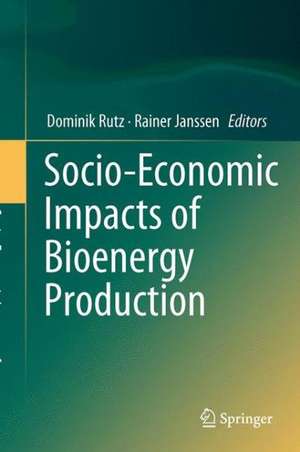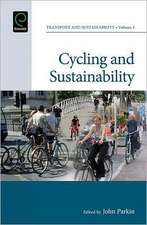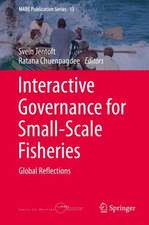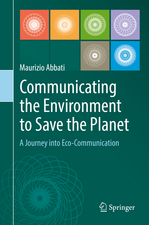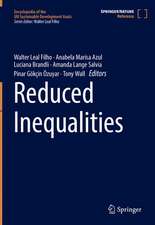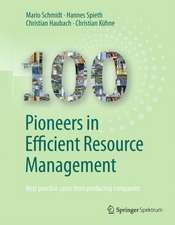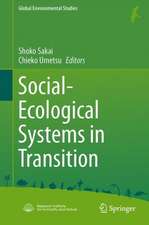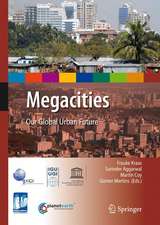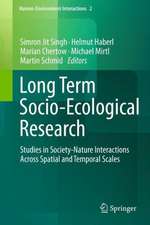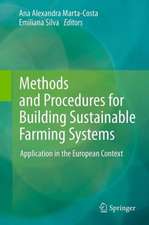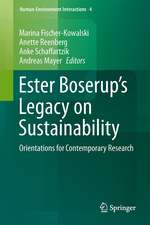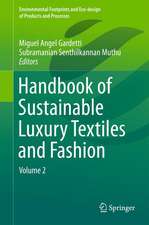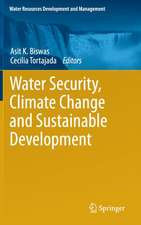Socio-Economic Impacts of Bioenergy Production
Editat de Dominik Rutz, Rainer Janssenen Limba Engleză Hardback – 7 mar 2014
The book surveys and analyzes global bioenergy production from a number of perspectives. The authors illustrate the complexity of interrelated topics in the bioenergy value chain, ranging from agriculture to conversion processes, as well as from social implications to environmental effects. It goes on to offer insight on future challenges associated with the expected boom of a global bio-based economy, which contributes to the paradigm shift from a fossil-based to a biomass and renewable energy-based economy.
The expert contributors include researchers, investors, policy makers, representatives from NGOs and other stakeholders, from Europe, Africa, Asia and Latin America. Their contributions build upon the results of the Global-Bio-Pact project on “Global Assessment of Biomass and Bio-product Impacts on Socio-economics and Sustainability,” which was supported by the European Commission in its 7th Framework Program for Research and Technological Development, conducted from February 2010 to January 2013.
The book benefits policy makers, scientists and NGO staffers working in the fields of agriculture, forestry, biotechnology and energy.
| Toate formatele și edițiile | Preț | Express |
|---|---|---|
| Paperback (1) | 563.17 lei 38-44 zile | |
| Springer International Publishing – 3 sep 2016 | 563.17 lei 38-44 zile | |
| Hardback (1) | 652.64 lei 6-8 săpt. | |
| Springer International Publishing – 7 mar 2014 | 652.64 lei 6-8 săpt. |
Preț: 652.64 lei
Preț vechi: 767.81 lei
-15% Nou
Puncte Express: 979
Preț estimativ în valută:
124.90€ • 129.91$ • 103.11£
124.90€ • 129.91$ • 103.11£
Carte tipărită la comandă
Livrare economică 14-28 aprilie
Preluare comenzi: 021 569.72.76
Specificații
ISBN-13: 9783319038285
ISBN-10: 3319038281
Pagini: 297
Ilustrații: XXVI, 297 p. 72 illus., 71 illus. in color.
Dimensiuni: 155 x 235 x 20 mm
Greutate: 0.76 kg
Ediția:2014
Editura: Springer International Publishing
Colecția Springer
Locul publicării:Cham, Switzerland
ISBN-10: 3319038281
Pagini: 297
Ilustrații: XXVI, 297 p. 72 illus., 71 illus. in color.
Dimensiuni: 155 x 235 x 20 mm
Greutate: 0.76 kg
Ediția:2014
Editura: Springer International Publishing
Colecția Springer
Locul publicării:Cham, Switzerland
Public țintă
ResearchCuprins
Preface.- 1. Socio-economic impact assessment tools.- 2. Indicators for socio-economic sustainability assessment.- 3. Test auditing of socio-economic indicators for biofuel production.- 4. Linkages between socio-economic and environmental impacts of bioenergy.- 5. Socio-economic impacts of biofuels on land use change.- 6. The effects of bioenergy production on food security.- 7. Socio-economic impacts of sweet sorghum in temperate and tropical regions.- 8. The use of soybean by-products as a biofuel: the Argentine case.- 9. Socio-economic impacts of palm oil and biodiesel: the case of Indonesia.- 10. Socio-economic experiences of different jatropha business models in Africa.- 11. Socio-economic impacts of jatropha oil and biodiesel in Mali.- 12. Socio-economic impacts of bioethanol from sugar cane in Brazil.- 13. Socio-economic effects of the sugar cane-to-ethanol production chain in Costa Rica.- 14. Socio-economic impacts of a lignocellulosic ethanol refinery in Canada.- 15. Biogas from organic waste in African cities.- 16. Analysis of socio-economic indicators on different bioenergy case studies.- 17. Summary: The contribution of bioenergy to energy access and energy security.- Index.
Recenzii
“The editors presented the intended themes in an organized and progressive manner via its arrayed, interrelated, and well-structured chapters. … our overall impression is that the book is a well written ‘guideline to assess the socio-economic implications of bioenergy production for scientists, practitioners, and decision makers who are interested in a biomass supply, cost-value, macro and micro-economics and value-chain perspective of bioenergy production.’” (Sheikh Adil Edrisi and P. C. Abhilash, Frontiers in Plant Science, Vol. 3, October, 2015)
Textul de pe ultima copertă
Around the world, many countries are increasing efforts to promote biomass production for industrial uses including biofuels and bio-products such as chemicals and bio-plastic. Against a backdrop of lively public debate on sustainability, bioenergy wields both positive and negative impacts upon a variety of environmental and socio-economic issues. These include property rights, labor conditions, social welfare, economic wealth, poverty reduction and more. This book discusses the issues and impacts of bioenergy, taking into account the local and regional framework under which bioenergy is produced, touching upon educational level, cultural aspects, the history and economies of the producing countries and an array of policies including environmental and social targets.
The book surveys and analyzes global bioenergy production from a number of perspectives. The authors illustrate the complexity of interrelated topics in the bioenergy value chain, ranging from agriculture to conversion processes, as well as from social implications to environmental effects. It goes on to offer insight on future challenges associated with the expected boom of a global bio-based economy, which contributes to the paradigm shift from a fossil-based to a biomass and renewable energy-based economy.
The expert contributors include researchers, investors, policy makers, representatives from NGOs and other stakeholders, from Europe, Africa, Asia and Latin America. Their contributions build upon the results of the Global-Bio-Pact project on “Global Assessment of Biomass and Bio-product Impacts on Socio-economics and Sustainability,” which was supported by the European Commission in its 7th Framework Program for Research and Technological Development, conducted from February 2010 to January 2013.
The book benefits policy makers, scientists and NGO staffers working in the fields of agriculture, forestry, biotechnology and energy.
The book surveys and analyzes global bioenergy production from a number of perspectives. The authors illustrate the complexity of interrelated topics in the bioenergy value chain, ranging from agriculture to conversion processes, as well as from social implications to environmental effects. It goes on to offer insight on future challenges associated with the expected boom of a global bio-based economy, which contributes to the paradigm shift from a fossil-based to a biomass and renewable energy-based economy.
The expert contributors include researchers, investors, policy makers, representatives from NGOs and other stakeholders, from Europe, Africa, Asia and Latin America. Their contributions build upon the results of the Global-Bio-Pact project on “Global Assessment of Biomass and Bio-product Impacts on Socio-economics and Sustainability,” which was supported by the European Commission in its 7th Framework Program for Research and Technological Development, conducted from February 2010 to January 2013.
The book benefits policy makers, scientists and NGO staffers working in the fields of agriculture, forestry, biotechnology and energy.
Caracteristici
The first international book to address the wide-ranging socio-economic impacts of bioenergy Offers a multi-disciplinary, multi-national analysis of different bioenergy value chains Builds on results of the EU-supported project on “Global Assessment of Biomass of Bio-product Impacts on Socio-Economics and Sustainability” Includes supplementary material: sn.pub/extras
